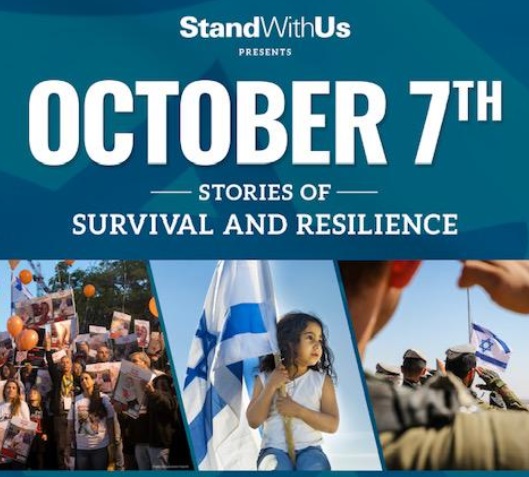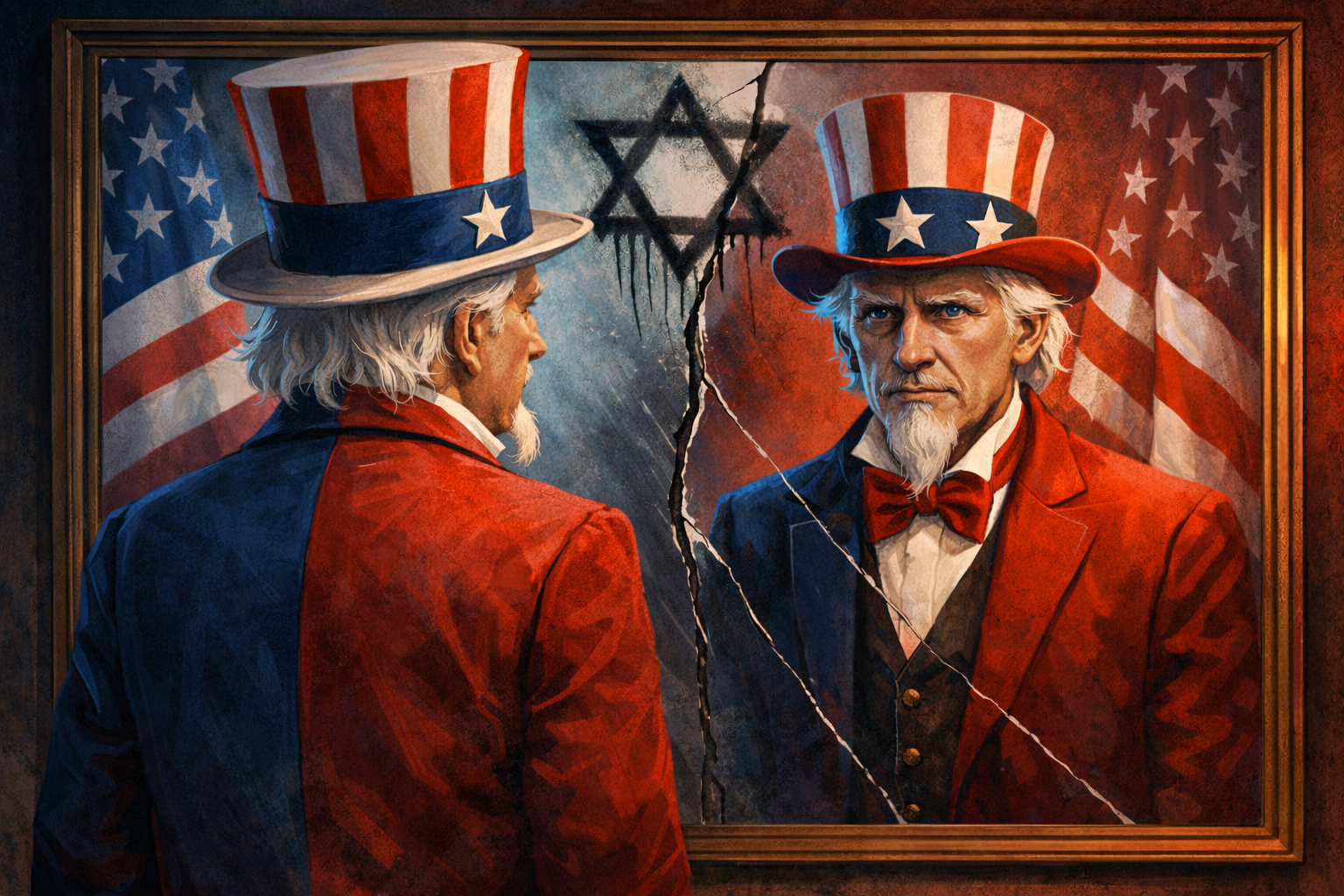By Steve Mark | Intermountain Jewish News | March 13, 2024

Five months removed from one of the most horrific days in Israeli history, Sagi Gabay recounts with vivid detail the attack that almost killed him.
“They took the opportunity to attack the festival because it was next to an open field,” said Gabay, “where there was nowhere for people to hide.
“They didn’t go to, maybe, Tel Aviv, because the festival was on a kibbutz, and it was a perfect opportunity for Hamas.”
Gabay, 28, was at the Nova Music Festival in Re’im on Oct. 7 when Hamas attacked Israel. Gabay and his former girlfriend Maya fled to a nearby bomb shelter.
“It’s not something you can imagine that can happen,” said Gabay. “In the open field I could smell the danger — like, literally smell danger.”
On the five-month anniversary of that fateful day, Gabay was in Denver as part of the speakers bureau of StandWithUs, an organization that supports Israel and combats anti-Semitism. Gabay was accompanied by Avigail Olman, who is on reserve duty with the Israeli Defense Forces’ Search and Rescue Unit in northern Israel.
Olman, 25, had her own brush with a moment of fate. Olman was scheduled to be stationed on Oct. 8 at Zakim, only one mile away from the Gaza border and directly in the Hamas attack zone.
“I never made it to that reserve duty,” said Olman. “It could have been me.
“I woke up on the seventh of October at nine o’clock from the sound of sirens. I remember running down to the bomb shelter and just feeling pure shock and trying to understand what was going on.
“I thought, maybe, the first siren was a mistake. Then there was another siren, and then 10 sirens in less than two hours. Then we knew that something was happening. I remember just feeling the shock, not understanding what was going on.
“I’m still trying to understand that this is really our reality. Now we know that these terrorists are capable for such insane and horrific things, and that you can’t trust the other side.”
Gabay and Olman traveled to four states in nine days on the StandWithUs tour, recounting their tale at Colorado’s Capitol, Resurrection Anglican Fellowship in Greenwood Village and at the Air Force Academy in Colorado Springs. The stories they shared were chilling.
Gabay’s recounting of the attack was particularly telling.
“I was with my friends, we were dancing, we were laughing, we were having fun,” said Gabay. “As the morning came, I went to the parking lot. It was exactly the time of the sunrise. It was one of the most beautiful sunrises I ever saw.
“Then I saw sparkling things in the sky. We were at a party and didn’t understand what they were. It took me five or seven seconds to understand they were rockets, and it seemed like thousands of them.
“It was crazy and not a normal number of rockets.”
“Looking back, we couldn’t expect for hundreds of terrorists just waiting to murder all of us. I called my friend Maya and we ran to my car. We started to drive on the road for about 200 meters, and then I saw a car on the opposite side of the road. It was full of bullets.
“There was a Hamas terrorist blocking all the roads and they just shot everyone who were trying to escape.
“We stopped the car and ran to the bomb shelter. There were already 30 or 40 people over there.
“My body just switched into survival mode and I had an intuition to leave the shelter. So, I grabbed Maya and went back to my car.”
As Gabay was leaving, he could see a Hamas terrorist attempting to kill those who had stayed in the bomb shelter.
“They were just shooting all the people who were inside the shelter,” Gabay said. “They would throw a grenade inside and everyone was trapped. There was no place for them to go.
“The only ones to survive were people who were hiding behind the dead bodies. I knew that would have been our destiny if we had stayed, so the decision to get back to the car was to save our lives.
“The road was blocked, and then someone waved to us to not go in that direction. I saw another car full of blood. We left the car and just ran away in the open fields.
“Everywhere we turned around, we could hear bullets whistle. Everyone was screaming. At that point I’m starting to think to myself what it’s like to get a bullet in your body.
“We started running for at least 30 minutes until we found that there was no terrorist behind our backs.
“We didn’t know at the time, but the people who survived were the ones who managed to get to the field and go east. We saw all the villages around us, burning. There were no cops, and no army nearby. It seemed like Pearl Harbor all over again.
“We walked for another four hours to another village that was further east.
“I felt like a refugee in my own country because when we found people who gave us food, the faces of the people were just empty.
“They were in a state of shock, and they were just starting to understand what was going on at that party.
“We saw a bus drive by and they picked us up. There were about 100 people on the bus, trying to find a safer place. We later talked with a friend, who brought us to Tel Aviv.”
By then, Gabay had been awake for 25 hours straight.
“Yeah, but you don’t feel tired from all the running,” said Gabay. “The adrenaline was just so high.”
When asked if he felt lucky to be alive, Gabay responded: “I think I understood that, the same day.”
During their visit to the IJN offices on March 8, Gabay was asked by IJN Assistant Editor Chris Leppek whether he could be suffering from PTSD.
“I think I was, in the beginning,” said Gabay, who was a news editor and sound technician for Israeli radio station Galatz while in the Israeli Defense Forces. “In the first few weeks I spoke with a professional a couple of times.
“For me, what is working is just to live my life by my routine.
“I’m doing OK. I’m really aware of how I feel and how to deal with it. My body is starting to get off the survival mode and start back to reality.
“I lost six people I knew, including a girl who I saw at the party who was murdered. All of my good friends — my crew — survived.
“I couldn’t leave home for the first week. And then, when I did leave, the first thing I did when I came back home was to open the news. And I just watched it. . . ”
Gabay’s voice suddenly trails off.
In the wake of mounting worldwide criticism of Israel’s self-defense against Hamas, Gabay and Olman stand behind the strategy of Israeli prime minister Benjamin Netanyahu.
“I think we should go back to Rafah,” Gabay said, “because as much pressure you can put on them (Hamas) is the only leverage you have. They don’t really care about the hostages. They don’t care about human life. And you cannot negotiate with monsters.
“You must stay committed to the goal to release all the hostages.”
“I don’t think there should be any negotiation about bringing people back home,” said Olman.
“People who were kidnapped from their homes, like a one-year-old, shouldn’t be held hostage in Gaza for doing nothing. The people who are held hostages aren’t people who were fighting this criminalization.
“There’s a whole discussion that they (Hamas) want to have a ceasefire and a negotiation about bringing back 30 hostages. It’s important to bring everyone back and the fact that we’re having a negotiation and asking for a list of people who are alive — they won’t even give that because they don’t know who’s alive. They don’t want to tell us.
“Our main goal right now is to bring back all the hostages.”
Even five months after the attack, on March 7, 2024, Olman thinks it is too soon to be second-guessing who in power in Israel might have been able to better resist Hamas’ strategic plan of Oct. 7.
“I think that a lot of people dropped the ball in different situations — maybe they thought that others wouldn’t realize it at the end,” said Olman.
“But right now, the most important thing is that we stay resilient, because we have another front to face up north.
“Also, you have everything that’s happening in the diaspora where you have to fight the anti-Semitism. You can’t just say, ‘let’s look at the politician at who’s fault.’
“Just not now.”
Gabay concluded:
“You need to continue the response in Gaza, full force. There’s no discussion about it.
“They came in and intruded and invaded our country without looking if they were killing an innocent woman or an innocent child. We’re at war, in a war that we didn’t bring upon ourselves, and people’s lives will be taken.
“They brought it upon themselves. And we should remember that part.”
Read full article here .





